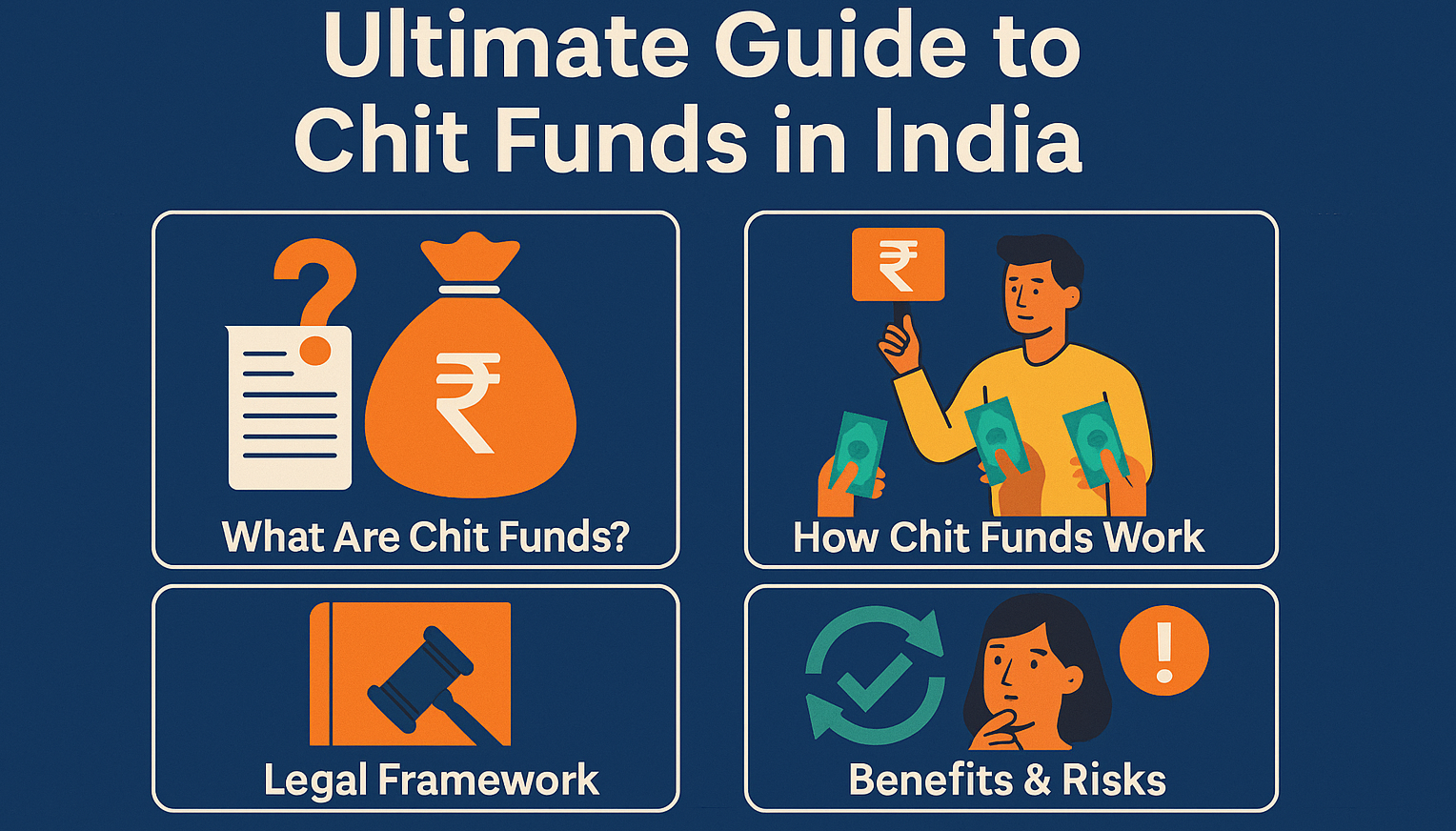
Chit funds have long been a staple of informal finance in India. They represent a unique blend of saving and borrowing, often fueled by community trust and local associations. Popular in both rural and urban settings, chit funds help families manage emergencies, fund weddings, pay for education, or support small businesses.
A chit fund is a type of rotating savings and credit association. Essentially, a group of individuals come together to contribute a fixed amount of money every month. At each turn, one member receives the pooled amount through an auction or lottery system. The process continues until each member has received the fund once.
Chit funds date back to pre-independence India, with deep roots in South Indian states like Kerala and Tamil Nadu. Over the decades, chit funds evolved from informal village gatherings to regulated financial instruments, especially after the Chit Funds Act of 1982.
Understanding how chit funds operate is crucial for anyone considering participating.
In a ₹1,00,000 chit fund with 10 members and monthly contributions of ₹10,000:
Registered chit funds operate under strict legal oversight, providing greater security. Unregistered ones, while convenient and community-run, pose higher risks.
With digital platforms rising, online chit funds bring transparency, mobile access, and regulated workflows.
Chit funds are legally governed by:
While chit funds are non-banking financial instruments, the RBI oversees overall financial stability. State registrars approve and monitor registered chit operators.
Unlike traditional savings schemes, chit funds let you save regularly and borrow when needed, creating financial flexibility.
Subscribers can access lump sums early in the cycle, especially useful during emergencies.
In small towns and villages, chit funds are built on social capital. Trust and mutual accountability play a big role.
Despite their benefits, chit funds come with significant risks:
If a member stops paying, it affects everyone else. Recovery is often difficult, especially in informal groups.
Many chit fund scams arise from unregistered operators who vanish with members’ money.
Without written agreements or oversight, many disputes go unresolved.
Choosing the right chit fund can make all the difference between a smart financial decision and a costly mistake.
Always opt for chit funds registered under the Chit Funds Act, 1982. These entities are audited and held accountable for regulatory compliance.
Research the company’s track record. Look at their settlement history, transparency, and customer testimonials.
Insist on a formal agreement. This should include terms on:
The dividend or surplus earned from chit funds is considered income from other sources and is taxable under the Income Tax Act.
If the income exceeds the threshold, TDS (Tax Deducted at Source) may be applicable. Always consult a tax advisor to ensure proper reporting.
The fintech revolution has brought traditional chit funds into the digital age.
Online chit funds offer:
One standout platform is MyPaisaa – a registered and RBI-compliant chit fund operator that provides transparent, user-friendly chit fund options. Users can join verified groups, track progress, and receive funds directly in their bank accounts. Learn more: mypaisaa.com
KSFE is a government-run chit fund company that offers secure chit fund options to Kerala residents. Known for transparency and punctuality.
Some states like Andhra Pradesh and Tamil Nadu also regulate cooperative societies offering chit-based saving schemes.
One of India’s largest online chit fund companies, with operations across multiple states. Headquartered in Hyderabad, it’s known for robust fund management, and consistent payouts.
Ramesh, a small shopkeeper in Tamil Nadu, used his chit winnings to buy a refrigerator, helping him store cold beverages and double his income in summer.
Women-led self-help groups (SHGs) in Andhra Pradesh use chit funds to finance stitching businesses, livestock purchases, and even mobile recharge booths.
Starting a chit fund business is legally possible if you follow the rules.
You need a minimum capital (varies by state) and must adhere to monthly reporting and audits.
While scams exist, registered chit funds are legal, regulated, and can be a good financial tool when managed properly.
Not at all. Many middle-class and even high-net-worth individuals invest in chit funds for short-term liquidity and community-based finance.
| Feature | Chit Funds | Mutual Funds | Fixed Deposits |
| Risk Level | Medium | Market-Linked | Low |
| Liquidity | High (if early bid) | Medium | Medium |
| Regulation | State Government | SEBI | RBI |
| Return Consistency | Varies | Varies | Fixed |
| Accessibility | High | Moderate | High |
These scams tarnished the image of chit funds. Saradha Group ran an illegal financial scheme disguised as a chit fund, defrauding thousands.
The government is working on digitizing chit fund operations and increasing oversight to prevent fraud.
With companies like MyPaisaa, the future of chit funds is becoming safer, smarter, and more financially inclusive.
Yes, they are legal and regulated under the Chit Funds Act, 1982. Always ensure you’re dealing with a registered chit fund company.
The foreman organizes the chit group, conducts auctions, and ensures transparent handling of the fund.
Yes. Any gain from chit funds is treated as income from other sources and must be declared in your tax return.
Absolutely. Platforms like MyPaisaa make it easy to join, contribute, and manage your chit fund digitally.
Risks include member default, mismanagement, and fraud, especially in unregistered chit groups.
Check if it’s registered with the state government, ask for their registration number, and review their audit and compliance reports.
Chit funds are an innovative hybrid of saving and borrowing, rooted in trust and community participation. With the rise of tech-enabled platforms like MyPaisaa and tighter legal regulations, they’re becoming safer and more efficient.
If you’re looking for a flexible, short-term financial instrument and are willing to do your due diligence, chit funds can be a valuable addition to your financial toolkit.






Comments (No Responses )
No comments yet.